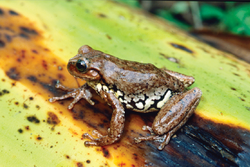Biology:Sarcohyla
| Sarcohyla | |
|---|---|

| |
| Sarcohyla hapsa | |
| Scientific classification | |
| Domain: | Eukaryota |
| Kingdom: | Animalia |
| Phylum: | Chordata |
| Class: | Amphibia |
| Order: | Anura |
| Family: | Hylidae |
| Subfamily: | Hylinae |
| Genus: | Sarcohyla |
| Type species | |
| Cauphias crassus Brocchi, 1877
| |
| Species | |
|
26 species (see text) | |
Sarcohyla is a genus of frogs in the family Hylidae.[1][2] It is endemic to Mexico and is found in the montane parts of the country between Durango in the north and Guerrero in the south. These frogs typically occur in pristine habitats along streams in pine-oak woodland at elevations between 1,500 and 3,100 m (4,900 and 10,200 ft) above sea level.[1] The generic name is derived from the Greek sarkodes meaning "fleshy" in combination with Hylas and refers to the thick, glandular skin characteristic of most of the species in the genus.[3]
Description
Sarcohyla are moderate to large-sized frogs. They have thick, glandular skin. Osteological characteristics include enlarged prepollex without a projecting spine and the alary process of the premaxilla that is not bifurcate posteriorly.[3]
Taxonomy
Sarcohyla was erected in 2016 based on molecular data. It contains species that were allocated to "Hyla bistincta" and "Hyla arborescandens groups" by Duellman in 2001[3] and to "Plectrohyla bistincta group" in some later works.[4] Its sister group is Plectrohyla.[3] Not all species of the genus were included in the molecular analysis, and there is some concern that the omitted species could challenge monophyly of the genus.[1]
Species
The genus contains 26 species:[1][2]
- Sarcohyla hazelae (Canseco-Márquez, Mendelson, and Gutiérrez-Mayén, 2002)
- (Taylor, 1942) Sarcohyla arborescandens
- (Taylor, 1939) Sarcohyla bistincta
- (Cope, 1877) Sarcohyla calvicollina
- (Toal, 1994) (Toal and Mendelson, 1995)
- (Caldwell, 1974) (Duellman, 1964)
- (Adler, 1965) (Caldwell, 1974)
- Kaplan, Heimes, and Aguilar, 2020 (Taylor, 1940)
- (Mendelson and Toal, 1996) (Adler, 1965)
- (Duellman, 1968) Sarcohyla miahuatlanensis
- Sarcohyla psarosema Sarcohyla thorectes
- Sarcohyla crassa Sarcohyla cyclada
- Sarcohyla hapsa Sarcohyla labeculata
- (Meik, Smith, Canseco-Márquez, and Campbell, 2006) (Campbell and Duellman, 2000)
- (Adler, 1965) Sarcohyla celata
- Sarcohyla cembra Sarcohyla charadricola
- Sarcohyla chryses (Brocchi, 1877)
- (Campbell and Duellman, 2000) Campbell, Brodie, Caviedes-Solis, Nieto-Montes de Oca, Luja, Flores-Villela, García-Vázquez, Sarker, and Wostl, 2018
- (Shannon, 1951) (Adler and Dennis, 1972)
- (Taylor, 1940) Grünwald, Franz-Chávez, Morales-Flores, Ahumada-Carrillo, and Jones, 2019
- Sarcohyla toyota Sarcohyla siopela
- (Caldwell, 1974) Sarcohyla pentheter
- Sarcohyla robertsorum Sarcohyla pachyderma
- Sarcohyla sabrina Sarcohyla mykter
- Sarcohyla ameibothalame Sarcohyla cyanomma
- Sarcohyla floresi Sarcohyla labedactyla
References
- ↑ 1.0 1.1 1.2 1.3 Frost, Darrel R. (2020). "Sarcohyla Duellman, Marion, and Hedges, 2016". Amphibian Species of the World: An Online Reference. Version 6.1. American Museum of Natural History. doi:10.5531/db.vz.0001. https://amphibiansoftheworld.amnh.org/Amphibia/Anura/Hylidae/Hylinae/Sarcohyla.
- ↑ 2.0 2.1 "Hylidae". AmphibiaWeb. University of California, Berkeley. 2020. https://amphibiaweb.org/lists/Hylidae.shtml.
- ↑ 3.0 3.1 3.2 3.3 Duellman, William E.; Marion, Angela B.; Hedges, S. Blair (2016). "Phylogenetics, classification, and biogeography of the treefrogs (Amphibia: Anura: Arboranae)". Zootaxa 4104 (1): 1–109. doi:10.11646/zootaxa.4104.1.1. PMID 27394762.
- ↑ Campbell, Jonathan A.; Brodie, Edmund D. Jr.; Caviedes-Solis, Itzue W.; De Oca, Adrián Nieto-Montes; Luja, Víctor H.; Flores-Villela, Oscar; García-Vázquez, Uri Omar; Sarker, Goutam Chandra et al. (2018). "Systematics of the frogs allocated to Sarcohyla bistincta sensu lato (Cope, 1877), with description of a new species from Western Mexico". Zootaxa 4422 (3): 366–384. doi:10.11646/zootaxa.4422.3.3. PMID 30313491.
Wikidata ☰ Q28042939 entry
 |

